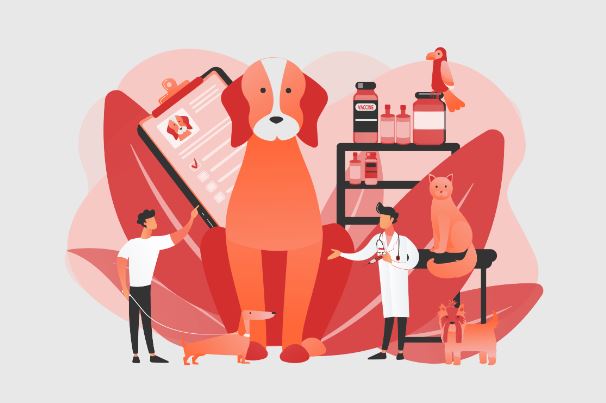6 Booming Animal Care Jobs for Animal Lovers
Animal care is an advantageous and exciting industry. However, it’s not all pets and cuddles.

If you’re an animal lover, you would have had exposure to some of the more complicated parts of animal and pet care. Sometimes animals decide your clean floor is their bathroom. Sometimes they get sick — really sick.
But these experiences mean you know all about their unconditional loving nature – the comfort they give after a tough day or the laughter they bring to your home.
There are many animal care jobs suited to all types of animal lovers in Australia. Here are the top six booming animal care pathways you should consider in 2025.
- 1. Veterinary nurse
- 2. Animal nutritionist
- 3. Animal centre attendant
- 4. Pet groomer
- 5. Conservation land manager
- 6. Zookeeper
1. Veterinary nurse
Animal nutritionists design, administer and evaluate diet plans for animals. These diet plans are designed to help animals reach optimum health or treat an illness or injury. Some animal nutritionists also advise the raw material selection for animal food products.
Animal food manufacturers, veterinary clinics, zoos and scientific research firms are some of the most common employers of animal nutritionists.
Key responsibilities include:
- Cleaning and maintaining equipment.
- Animal handling such as feeding, exercising and playing with the animals.
- Assisting veterinarians during check-ups and surgeries.
- Communicating with pet owners about animal health.
- Administrative duties.
Animal nutritionists need a keen interest in not only animal health but biosciences and chemistry too.
Critical skills include:
- Good communication
- Organisation
- Time management
- Attention to detail
- Basic computer skills
A vet nurse’s salary will grow with experience. On average, a vet nurse’s pay is:
$64k
ENTRY LEVEL
$70k
MEDIAN
$81k
EXPERIENCED
To become a vet nurse, you’ll need a Certificate III or IV in Veterinary Nursing. Many people choose to complete a short course and volunteer at animal shelters or veterinary hospitals to build their skills and confidence before committing to longer-term education.
2. Animal nutritionist
Animal nutritionists design, administer and evaluate diet plans for animals. These diet plans are designed to help animals reach optimum health or treat an illness or injury. Some animal nutritionists also advise the raw material selection for animal food products.
Animal food manufacturers, veterinary clinics, zoos and scientific research firms are some of the most common employers of animal nutritionists.
Key responsibilities include:
- Educate animal care professionals and individuals on appropriate diet habits for specific cases.
- Advise product development and nutritional information to both manufacturers and consumers.
- Develop, administer and evaluate dietary studies for nutritional research.
- Consult with other professionals to manage dietary and nutritional needs.
Animal nutritionists need a keen interest in not only animal health but biosciences and chemistry too.
Critical skills include:
- Analytic problem-solving
- Communication
- Ability to work both collaboratively and independently
- Animal management
- Ability to observe and accurately evaluate
Animal nutritionists have an average salary progression of:
$85k
UNDER 2 YEARS
$97k
2 TO 5 YEARS
$105k
5 TO 10 YEARS
You’ll need to hold a tertiary qualification in science, horti- or agri-culture veterinary studies to become an animal nutritionist. From here, you can land an entry-level role to gain professional experience.
Alternatively, you can complete a graduate qualification focusing on animal nutrition. A short course in animal care can help develop the basic skills and knowledge required to embark on tertiary-level studies.
3. Animal centre attendant
If a more animal-centred, hands-on role is for you, consider becoming an animal attendant. Animal attendants can work in a wide range of environments, such as shelters, kennels, catteries and farms. Both full-time and part-time work are available in this role.
Key responsibilities include:
- Prepare food and water.
- Bathe, groom and administer basic medicines.
- Clean and prepare living and sleeping quarters.
- Maintain accurate animal records.
- Communicate with other staff and owners.
Animal attendants work very closely with animals and are often responsible for their day-to-day activities.
Some critical requirements for animal attendants are:
- Physically fit
- Observant
- Patient
- Good communication
- Ability to work both in a team and independently
Animal attendants have an average salary progression of:
$57k
ENTRY LEVEL
$61k
3+ YEARS
$71k
5 TO 10 YEARS
Completing a short certificate course in animal welfare or animal studies will help develop all the critical skills required to enter the industry as an animal attendant.
4. Pet groomer
Working closely with animals every day, pet groomers are entrusted with maintaining domestic animals’ hygiene and cleanliness. They require both excellent animal handling skills and people skills.
Key responsibilities include:
- Animal control
- Washing, drying and brushing animals
- Nail clipping
- Teeth brushing
- Administrative skills
- Haircutting and styling
- Client communication
The average salary expectations for pet grooming have projected to grow by 10% in the next five years.
Currently, the average salary progression of:
$47k
ENTRY LEVEL
$62k
MEDIAN
$80k
EXPERIENCED
Pet groomers don’t require any one specific qualification to practice. However, a certificate-level course in animal studies is a great way to develop all the relevant skills required of a pet groomer.
5. Conservation land manager
Conservation land managers work to protect and conserve wildlife, habitats and biodiversity of specific land areas.
These professionals usually work for land trusts or conservation organisations and require in-depth knowledge about the land, flora and fauna, and other unique aspects of its landscape. Native animal care and conservation are central to this job.
Key responsibilities include:
- Clearing, maintaining and establishing trails, paths and clearings.
- Designing bio-ethical structures within the natural habitats (signs, benches, sheds, etc.).
- Managing restoration efforts, including removing invasive species and natural damage.
- Work and communicate with the general public and other land conservationists to ensure conservative efforts are practical, sustainable and effective.
Conservation land managers have an average salary progression of:
$77k
ENTRY LEVEL
$132k
2+ YEARS
$177k
EXPERIENCED
Most conservation land managers complete a bachelor’s degree qualification in environmental studies, agriculture or environmental biology.
Completing a related short course, such as wildlife conservation and management, before committing to longer-term tertiary study is a great way to gauge whether this pathway is right for you.
6. Zookkeeper
Zookeepers work closely with wildlife every day. From feeding to playing to monitoring animals’ health, zookeepers are critical to the wellbeing of our zoos’ wildlife.
Key responsibilities include:
- Feeding and watering the animals according to schedule and dietary requirements.
- Playing and socialising with the animals.
- Cleaning and maintaining the animals’ living areas and habitats.
- Monitoring and observing the animals closely to ensure normal behaviour and good health.
Zookeepers work with a wide range of wildlife and require some critical skills to do their jobs successfully, including:
- Confidence in handling and caring for all forms of wildlife
- Observation and evaluation skills
- Good physical health
- Knowledge in animal grooming, diets and behaviour patterns
Animal attendants have an average salary progression of:
$35k
ENTRY LEVEL
$54k
3+ YEARS
$74k
EXPERIENCED
To start your journey as a Zookeeper, you’ll need to complete a Certificate II or III in Animal Studies and Captive Animals. From here, you can choose to progress to a career as a zoologists or wildlife biologist!
Animal care comes in all shapes and sizes, so there’s sure to be the perfect career path for you and your interests. Although this field is not without its challenges, there’s nothing better than contributing to our furry friends’ welfare and happiness.
If you’re ready to step into a new job in this incredibly rewarding industry, it’s time to consider the next step.
Browse animal care education and training and kickstart your dream career!



